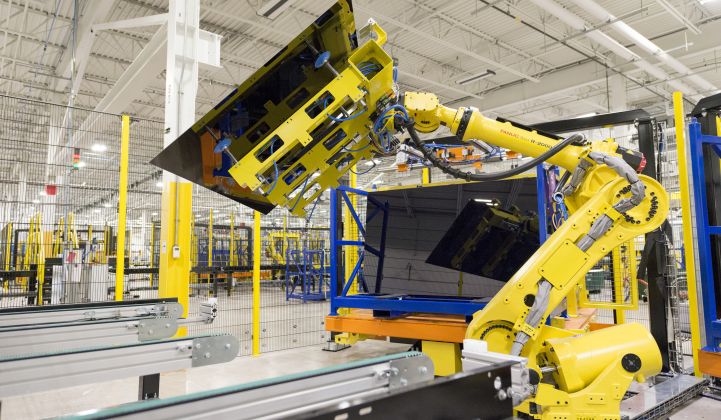First Solar withdrew most of its 2020 guidance on Thursday despite saying it has not yet experienced any major business impact from the global coronavirus pandemic, highlighting the uncertainty facing the global solar market.
First Solar executives said that plans to potentially sell the company’s solar-project development business could be delayed as a result of the difficulty of dealmaking in the current climate.
In February, First Solar, the only U.S.-based PV manufacturer among the top 10 globally, said it expected net sales of as much $2.9 billion this year and earnings per share of up to $3.75, as it approaches the finish line of its multiyear shift to its new Series 6 thin-film modules.
That guidance is now gone. Solar module prices are under growing pressure around the world as the market moves further into a state of oversupply. While many PV manufacturers have reopened their factories in the wake of the initial coronavirus outbreak, key solar markets are expected to be flat or even shrink this year amid construction delays, difficult financing conditions and depressed power demand.
“The biggest impact we’re having around guidance is the uncertainty of the capital markets,” First Solar CEO Mark Widmar told analysts on a conference call discussing the company’s first-quarter earnings results. Current market conditions are making it difficult to put a fair valuation on projects the company may look to sell this year, he said.
At the same time, some of First Solar’s module-buying customers may face delays with their own projects, Widmar added. “We felt that given where we are right now, with all the uncertainty we have, the right thing to do was to pull guidance.”
An oversupplied solar module market
A growing list of clean-energy companies have now suspended or simply declined to offer guidance for 2020, among them Tesla, Sunrun, Vestas and others.
Wood Mackenzie recently revised its forecast downward for the 2020 global solar market by 17 percent, to around 109 gigawatts — essentially flat compared to last year. At the same time, solar module manufacturers are expected to grow their cumulative production capacity by 16 gigawatts, WoodMac data shows. The global solar market is expected to resume growth in 2021.
First Solar’s factories in Ohio, Malaysia and Vietnam have largely been kept up and running during the COVID-19 pandemic, although one of its facilities in Ohio saw its output reduced for a few weeks as employees were kept home by school and daycare closures, Widmar said. The company expects to make 5.9 gigawatts of panels this year.
First Solar reported a net profit of $90.7 million in the first quarter, up sharply from a loss of $67.6 million in the same period last year. The company held its revenue steady at $532 million while shrinking its cost of sales, but its bottom line got a big boost from an $89 million tax benefit under federal U.S. stimulus funds related to the pandemic.
First Solar’s comfortable cushion of cash and marketable securities — a critical differentiator versus many of its debt-saddled manufacturing rivals — shrank to $1.6 billion, down from $2.3 billion at the end of last quarter. A good chunk of the drop came from paying out $350 million to settle a class-action lawsuit filed in 2012.
Over the last year, First Solar has moved to intensify its focus around manufacturing, announcing plans to begin using external engineering contracts rather than building its own projects — and saying it is “reviewing options” for its project development business.
CFO Alex Bradley said First Solar continues to work with financial advisers on a possible sale or partnership for its project division; it suggested things are moving slowly because of COVID-19.




